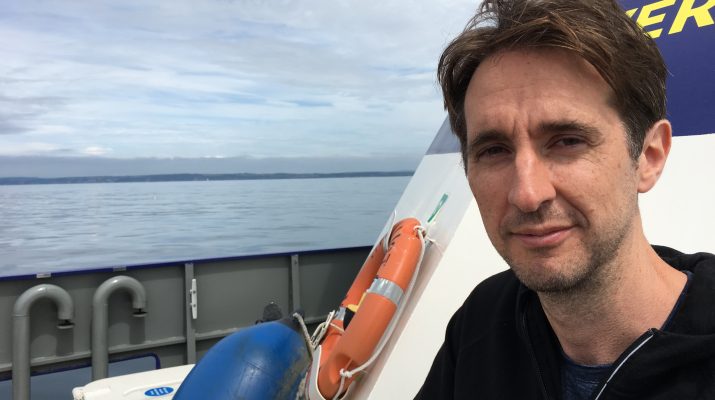Deep-Sea Biology Society https://dsbsoc.org
President’s Letter, June 2018
Dear Deep-Sea Biology Colleagues,
I am delighted to report to you that since my last President’s Letter in January the membership of our Society has increased by a staggering 126% to a total of 415 members (57% females, 31% students) from 36 countries (including 10 developing countries). The more politically-minded President might retire gracefully at this point, before disaster befalls. But the more observant amongst you will have noted that this excellent news is not down to me campaigning across the lands but the rather more simple process of linking membership to registration for the most important meeting of the year: the 15th Deep-Sea Biology Symposium to be held in Monterey, California from 9-14 September. Nevertheless, this marks a very important moment for the Society – the first complete integration of membership into the triennial Symposium which we hope will bring membership and the benefits of membership to a much wider audience.
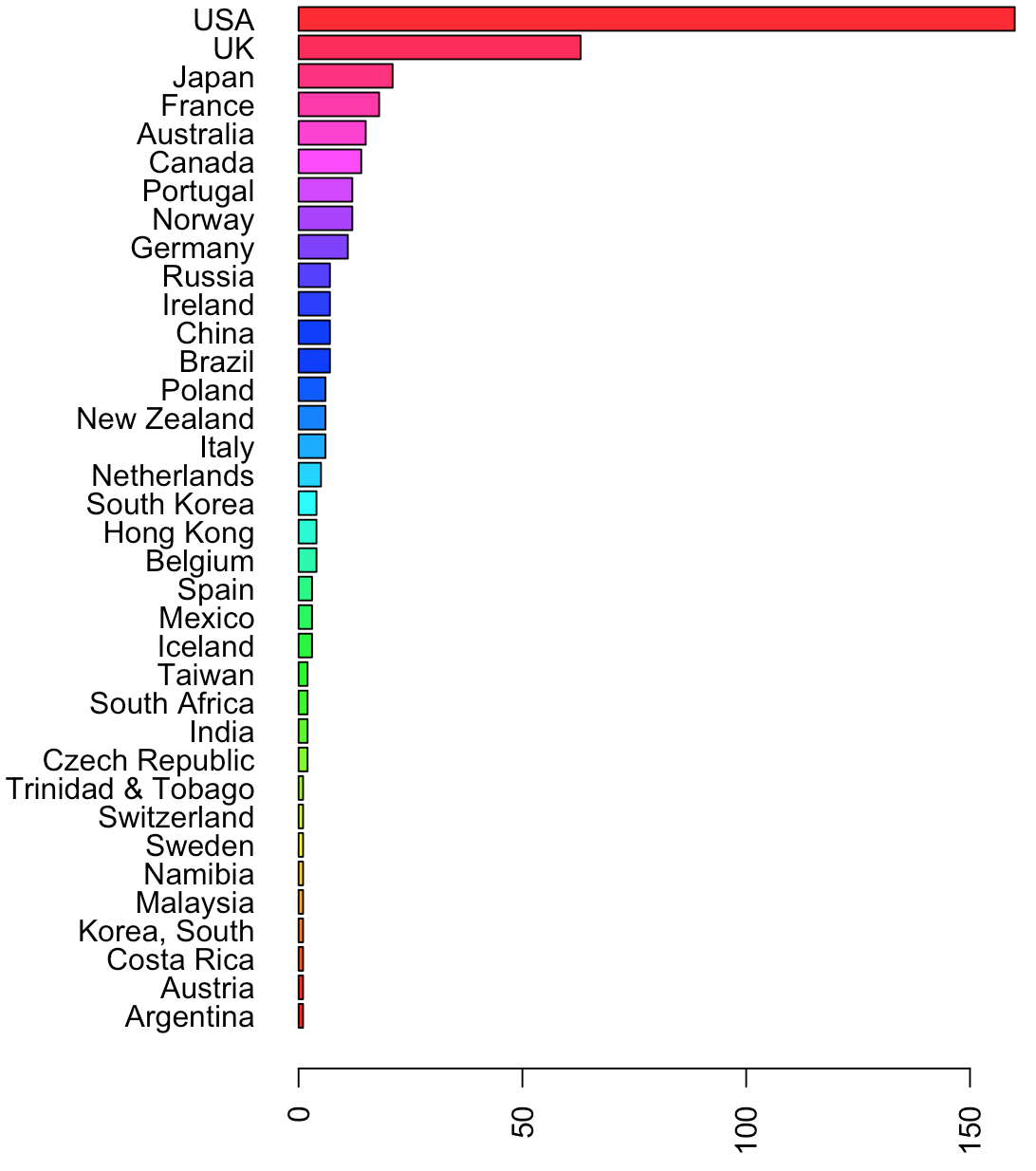
Our VP for Conferences, Steve Haddock, will have more to say on the Symposium later in this issue of Deep-Sea Life. The most important thing to note is that although the deadline for talk and poster abstracts has passed, anyone can still register to attend the meeting up until 24 August. We are incredibly grateful for the effort Steve and the local organising team in Monterey have made so far in preparations for the conference, which is already on track to be the largest ever meeting of its kind.
Over the last 6 months, the Society has been active in many areas. All of the work undertaken by the Society Officers and Trustees is on a completely voluntary basis, and all of us should be very grateful for the efforts they have undertaken. Alongside the support to the forthcoming 15th DSBS, we have been delivering our Awards that help to re-distribute Society funds to students and early-career researchers (thank you Rachel Jeffreys), communicating and supporting Students alongside planning Student events at the next Symposium (thank you Paris Stefanoudis), launching a new mentoring network (thank you again Rachel), organising all our meetings, minuting them and re-activating our web and social media feeds (thank you Diva Amon and Paris), re-organising our membership system to comply with Data Protection law and linking membership to the Symposium (thank you Santiago Herrera and Steve Haddock), re-launching the Deep-Sea Life newsletter with sponsorship from the Society (thank you Maria Baker and Paris) and keeping an expert eye on, and handling, our Finances and legal requirements (thank you Chris Yesson).
Throughout this process, our ‘non-executive’ Trustees of the Society – those that sit on the main bi-monthly DSBS committee meeting and have voting rights but not a distinct portfolio, have been keeping a watchful eye on our activities and providing much useful contribution. We are especially grateful to Malcolm Clark, Craig McClain, Moriaki Yasuhara, Rachel Boschen, Erin Easton and Paul Snelgrove for this.
This brings me neatly to perhaps the most important point I want to make in this letter. At the 15th DSBS, all of the positions for Officers and Trustees will be up for re-election. There is thus an opportunity for any member of the Society to stand for one of these positions and help shape the future of the Society and the work of all deep-sea biologists. Later in this issue of Deep-Sea Life, and also concurrently posted on the DSBS website, will be descriptions of all the positions available.
Why apply for an unpaid position in a Society when you are already extremely busy? I think that for most of us, being part of a global, communicating and collaborating community of researchers and educators in a discipline that we love is a fairly important thing. But communities do not form without some work – communication channels, meetings, workshops, mentoring and financial support for those that need it. Above all, our community must be open. Deep-Sea Biology, perhaps more than most disciplines, has been a ‘Rich Man’s Game’ – quite literally – for most of its existence. One of the founding goals of the Society was to try to overcome that – creating networks and sources of funding to improve demographic diversity and open-up the resources and cliques of the traditional players. There is still a long way to go. But we are making progress.
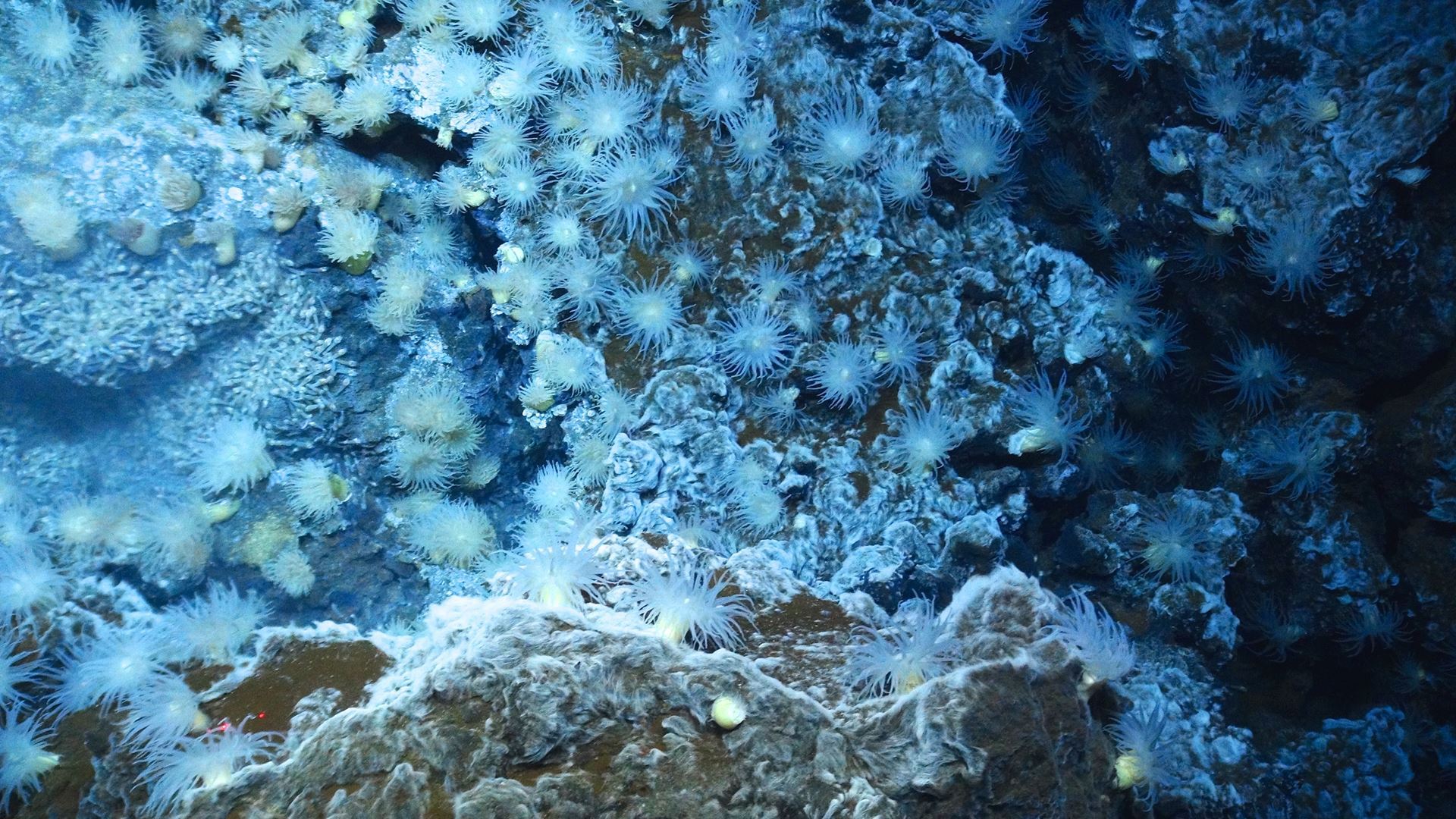
We are not yet a large enough Society to sponsor expeditions or pay salaries. But we can now make a difference. This year, we have been able to make twelve travel awards (more than ever before) to the 15th DSBS in Monterey that we hope will play a small, but important part in this process. With rapidly-growing membership, we can increase our financial turnover, but perhaps most importantly, start to gain recognition on a global basis as an organisation supporting the education and careers of all those interested in deep-sea biology and conservation. With this will come opportunities to further diversify and grow income to support the work of all deep-sea biologists.
Some of the Society Officers will report back in this issue of Deep-Sea Life on aspects of work in the Society. For those of you reading this as an email, you will be able to download Deep-Sea Life from the website or read articles directly on there. Most importantly, the date to remember for your diaries is not just the 9-14 September, but in fact the evening of the 12th September, mid-week at the 15th DSBS, when we will have the second Annual General Meeting of the Deep-Sea Biology Society. All members are invited, and although there is important business to attend to, we promise to make it fun as well.
Adrian Glover, President
15th Deep-Sea Biology Symposium
We are looking forward to welcoming you in Monterey, California for the 15th Deep-Sea Biology Symposium! Although the oral and poster presentation deadlines have passed, registration for the meeting is still open!
The Symposium is the main event for the Deep-Sea Biology Society, and takes place every three years. It brings together leaders from the fields of research, exploration, marine operations, conservation, and management for the deep ocean environment, including benthic, vents and seeps, and water-column biology and oceanography.
Returning to the United States for the first time since 2003, the 15th Deep-Sea Biology Symposium will be held September 9-14, 2018 in Monterey, California. This 5-day conference will feature plenary speakers and two daily concurrent sessions. There will be an opening reception, a poster session on Tuesday night, and a concluding symposium dinner on Friday night at the world renowned Monterey Bay Aquarium. Meeting registration includes a membership in the Deep-Sea Biology Society and all are invited to the Society Annual General Meeting (see below).
There is a limited number of specially discounted rooms available at the conference hotel. Book through the link on this page to receive these special rates. It would help the Society and the Local Organising Committee greatly if you make your room bookings at this hotel.
The 15th Deep-Sea Biology Symposium is supported by the Deep-Sea Biology Society and co-hosted by the Monterey Bay Aquarium Research Institute and the Monterey Bay Aquarium.
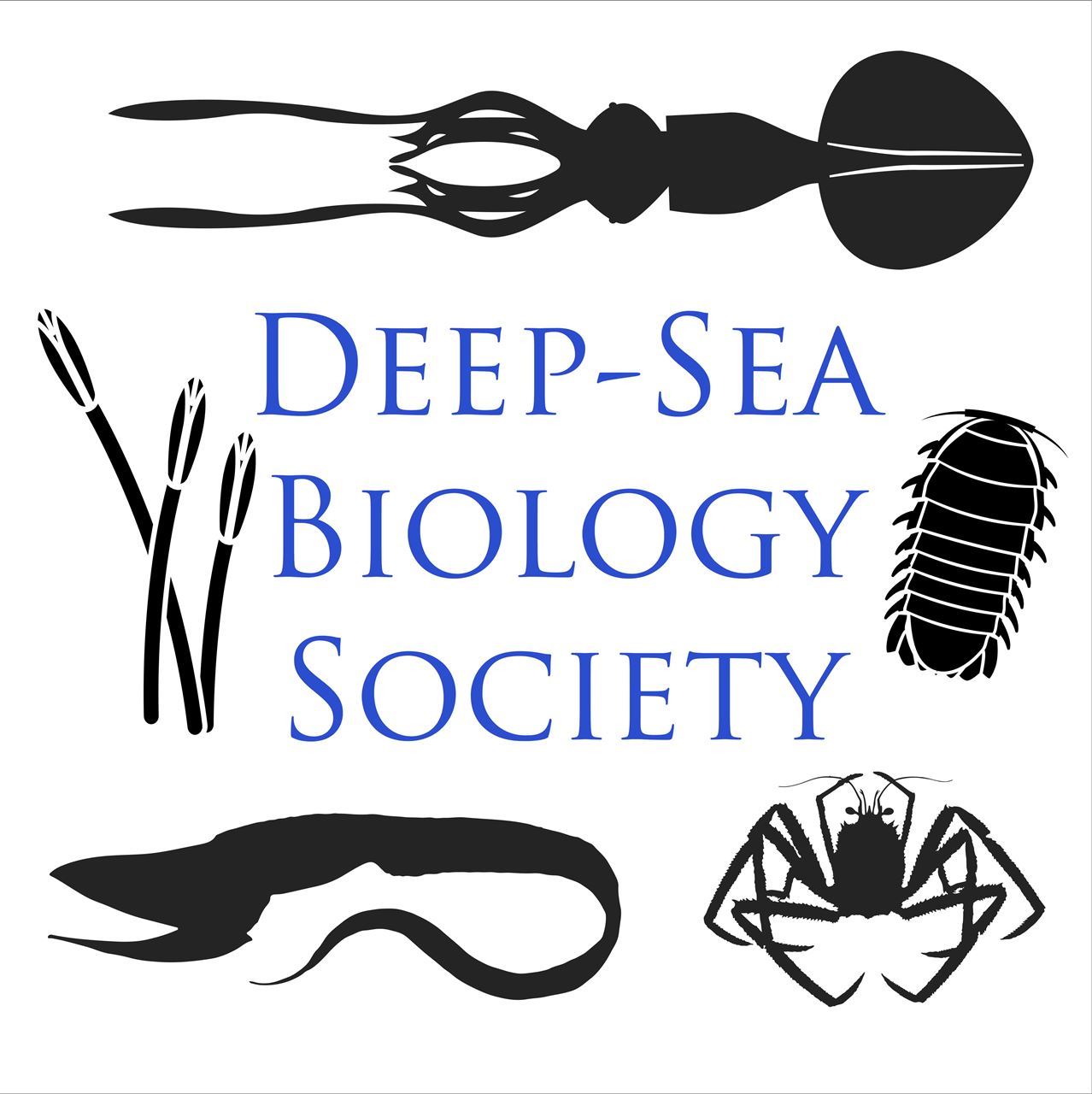
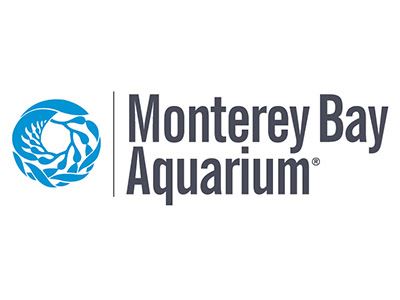
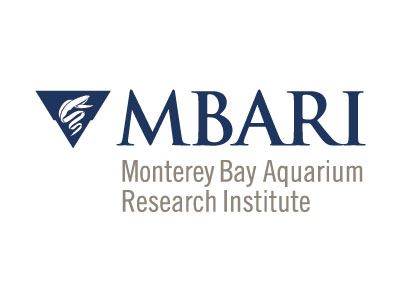

Annual General Meeting and Nominations for Officers and Trustees of the Society
Notification of the 2018 Annual General Meeting (AGM) of the Deep-Sea Biology Society. The 2018 AGM will be held at 6.30pm on 12th September 2018 during the 15th Deep-Sea Biology Symposium at the Monterey Conference Centre, 1 Portola Plaza, Monterey, CA 93940, USA. An agenda will be circulated to all members.
The AGM will include reports from the Officers, Nominations and Voting for Officers and Trustees of the Deep-Sea Biology Society, and a social event.
There are 15 positions on the board of Officers and Trustees of the Deep-Sea Biology Society. 14 of these are currently filled, and all positions are up for election at the AGM 2018. We would like to encourage all members interested to consider standing for a position. These are important roles that will help to shape the future of deep-sea biology research, education and professional development.
The procedure is that nominations must be sent directly to the current Secretary, Dr Diva Amon (divaamon@gmail.com) by 31 July 2018. Each nomination should include the candidate’s written agreement (email is acceptable) for nomination and a short statement (less than 200 words) describing their interest in the position.
Positions open for nominations (closing 31 July 2018):
Executive (Officer) roles:
President. From the constitution: ‘The President shall be the principal officer of the DSBS and shall in general supervise and have charge of all of the affairs of the DSBS pursuant to the direction and oversight of the trustees.’ In less formal terms, the main duties of the President are providing leadership and a strategic direction for the Society, chairing Trustee Meetings and the AGM, and writing the President’s Letter twice per year.
Secretary. From the constitution: ‘The Secretary shall record the minutes of all meetings of the Trustees and membership meetings; maintain such minutes…see that all notices are duly given in accordance with the provisions of the Constitution of the CIO or as required by law…’. In less formal terms, the Secretary is a vital voting member of the Trustees that not only is responsible for arranging and minuting meetings but also that the Society is following the Law under our status as a Charitable Incorporated Organisation (CIO).
Treasurer. From the constitution: ‘The Treasurer shall exercise oversight over all financial business, including funds and securities of the CIO…’. In less formal terms, the Treasurer is a key role with oversight and administration of all financial matters.
Membership Secretary and Data Protection Officer. From the constitution: ‘The Membership Secretary shall oversee every aspect of the membership process including but not limited to: approve, or in special cases present to the trustees, qualifications for membership; ensure members pay membership fees…’. In less formal terms, the Membership Secretary will be mainly responsible for all membership issues including administration of the Society membership software (a web platform called Wild Apricot). The role has been expanded to include the position of Data Protection Officer, which is in charge of ensuring that the society applies laws protecting individuals’ personal data.
Vice President for Conferences. From the constitution: ‘The Vice President for Conferences shall oversee the planning, funding, and hosting of the triennial Deep-Sea Biology meeting. The Vice President of Conferences should be from the institution and/or geographic locality of the meeting. The Vice President of Conferences may call committees to accomplish specific tasks as related to the meeting.’ In less formal terms, the VP Conferences is responsible for ensuring that the Deep-Sea Biology Symposium takes place and would be the lead of the Local Organising Committee (LOC) of that Symposium, providing a link between the Society, its Trustees, Membership and the LOC. This position is not open for nominations except via submission of a bid to host the 16th Deep-Sea Biology Symposium.
Vice President for Awards. From the constitution: ‘Vice President for Awards shall oversee the process for nomination, judging, and awarding of travel awards, student awards, honorary memberships, and other awards.’
Vice President for Public Affairs and Communication. From the constitution: ‘Vice President for Public Affairs and Communications shall oversee the creation and maintenance of the society’s website, social media, press releases, and other public statements on behalf of the society…They will develop and maintain a social media strategy as approved by the Trustees.’ In less formal terms, the VP Public Affairs and Communication is responsible for the website, social media presence and contributions to the Deep-Sea Life Newsletter.
Vice President for Development. From the constitution: ‘Vice President for Development shall support the financial development of the Society by supporting charitable giving to the Society including endowments, grants and links to philanthropic organisations.’.
Early-Career Officer. From the constitution: ‘The Early-Career Officer shall represent the Early-Career Researcher interests of the Society in all trustees meetings. The Representative will assist with the Societies mission to further the professional development of Early-Career Researchers e.g. through mentoring programs and awards, as well as facilitate communication to Early-Career Researchers within and beyond the Society, and support the demographic diversity of the Early-Career membership of the Society’. Early-Career is defined as post-PhD but pre-tenure, or equivalent permanent position.
Student Officer. From the constitution: ‘The Student Officer shall represent the student interests of the Society in all trustees meetings. The Student Representative will assist with the process of awards for student accomplishment at the Deep-Sea Biology Symposium, facilitate communication with student members about opportunities within and beyond the Society, will act to support the demographic diversity of the student membership of the Society’.
Non-executive (Trustee) roles:
Past-President. From the constitution: ‘The Past-President shall assist the President as needed, and provide continuity to the trustees.
Trustees without designated roles. From the constitution: ‘There are a maximum of 4 additional Trustees without designated roles. These trustees will support the charity with specific roles and cast votes on issues requiring Trustee support.’. In less formal terms, these important positions are there to provide guidance, voting and oversight of the Executive Officers.
Society Web and Social Media Communication
In anticipation of the XVth Deep-Sea Biology Symposium, we have created a public Slack team for the Deep-Sea Biology Society. If you haven’t used slack, it is a like a hybrid between facebook and email, where you can post messages and reactions – only a lot more efficient than an email list.
To join the team, follow this link: http://j.mp/deepslack
Some recommendations:
• Create a screen name that is similar to your real name (not your favorite organism) so others can tell who is posting.
• It is more efficient if you install the slack apps on your computer and even your phone, to make posting and reading messages easier.
We will share information for the conference on the slack team, as well as other opportunities and news related to deep-sea research in general.
Having re-activated our web and social media feeds, we now have regular updates and blog posts on the Society’s webpage. You can see some recent blog posts from the Society’s 2018 awardees here. Following the integration between the Deep-Sea Biology Society and communication aspects of INDEEP, Deep-Sea Life (DSL) news pieces will be featured on the DSBS website and social media feeds in the weeks following the release of a new DSL issue.
Acknowledging the limited funds available to conduct marine biological research, we now also provide information on external funding opportunities. You can find that information here. We plan to keep updating the list so that it becomes a valuable online source for deep-sea biologists seeking for funding, thus we welcome any contributions from you (please email Paris Stefanoudis at pstefa@windowslive.com).
Finally, we witnessed a staggering 25% increase of our Twitter followers over the last six months, which now stand at well >2100. We are committed to strengthen our social media presence in the coming months even more, so as to ensure that we stay connected with the growing community of deep-sea biologist around the world. You can follow us here.
Society Awards and Prizes
Report on 2017 Calls
The Society awarded two Dive Deeper bursaries, four travel awards, one Lounsbery workshop award and the paper of the year in 2017.
Michelle Taylor (University of Essex, UK) and Brit Finucci (Victoria University of Wellington, NZ) received a Diver Deeper Award, you can read about how the bursaries aided them in their research here.
Travel awards for the 6th Chemosynthetic Based Ecosystems symposium at Woods Hole, MA, USA were awarded to: Shelbi Russell (University of California Santa Cruz), Jessica Panzarino (Harvard University), Olivia Pereira (Scripps Institute of Oceanography) and Abbie Chapman (University of Southampton), who also was awarded the Deep-Sea Biology Society prize for the best student talk. Blogs from our travel awards can be found here.
Fig. 3. 2017 travel-awardees Olivia Soares Pereira (left) and Abbie Chapman (right) presenting their work during the 6th Chemosynthetic Based Ecosystems symposium.
Kerry Howell (Plymouth University) organised the first Lounsbery workshop with the Marine Institute (Plymouth University). It was also the first international workshop on the development of a standardised deep-sea species image catalogue for the North Atlantic. During the workshop formalised tools and training materials were developed for new researchers working on field identification of taxa at a regional level. It was held in Plymouth 6th December 2017, 31 researchers attended and the results and recommendations will be published in a peer-reviewed journal later this year.
Finally the paper of the year award was awarded to Andrea Quattrini and co-authors for their paper titled ‘Environmental filtering and neutral processes shape octocoral community assembly in the deep sea.’ The award was presented to Andrea at the DSBSoc AGM at the 6th Chemosynthetic based ecosystems symposium in Woods Hole MA, USA. You can read the paper here.
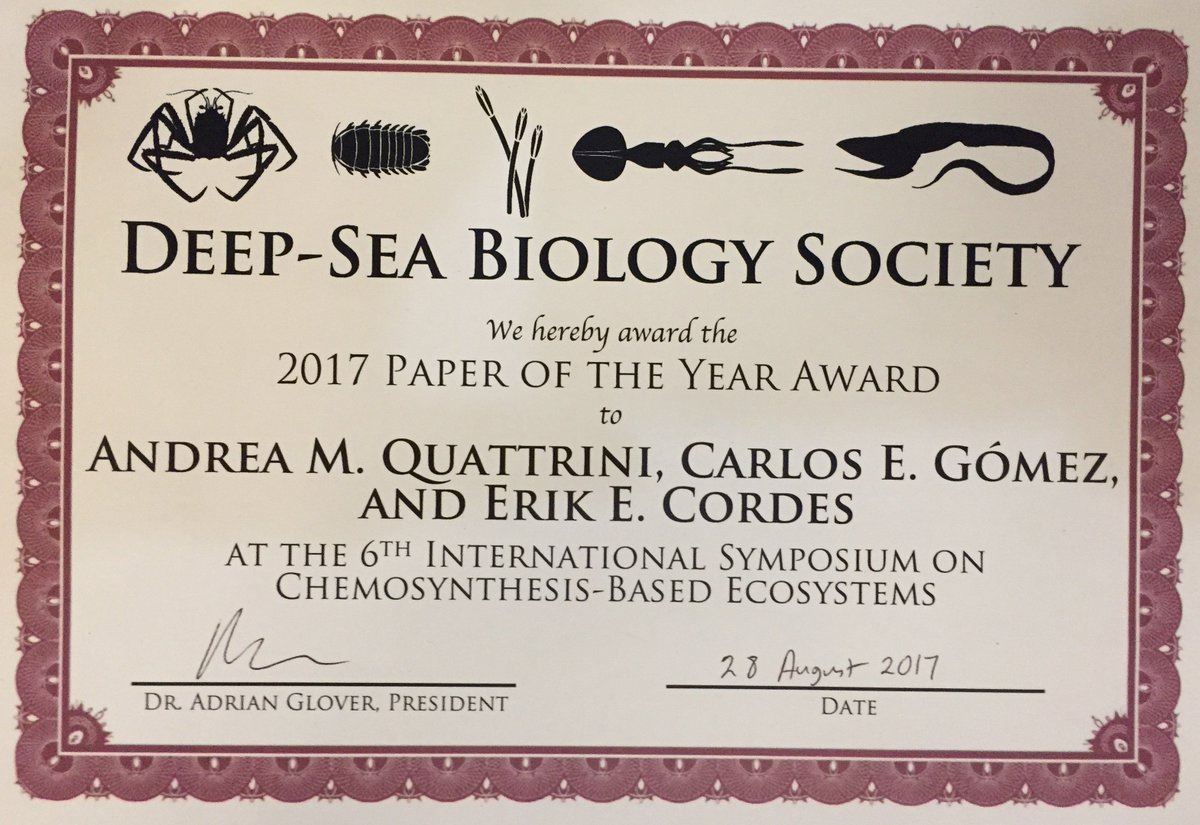
Calls open for 2018
We have awarded Dive Deeper awards this year to Madeleine Braiser (University of Liverpool and NHM, UK) and Matthew Galaska (Lehigh University, USA) see here for more details.
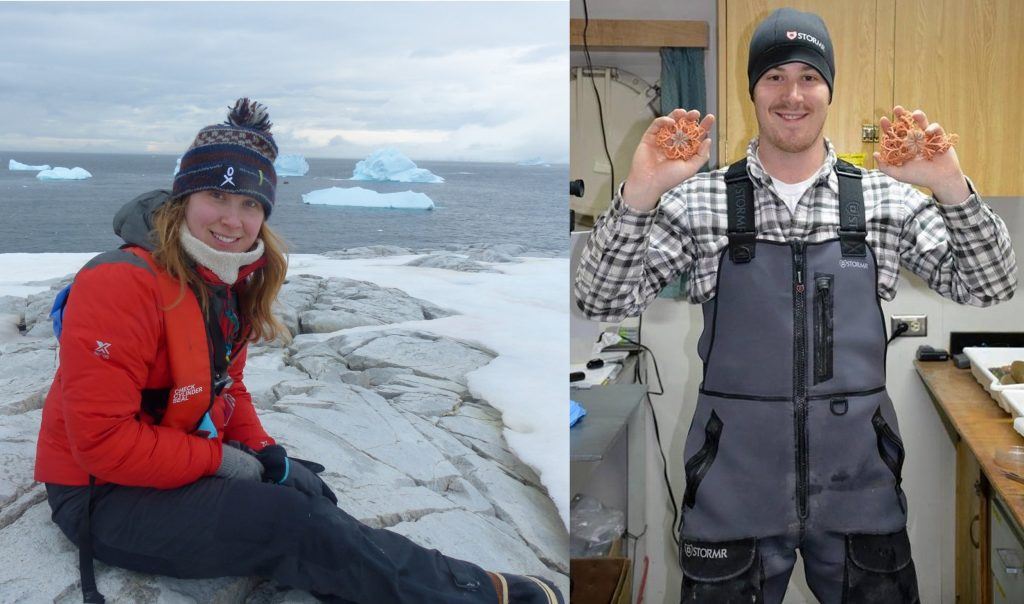
We will be announcing the winners of the Deep-Sea Biology Society travel awards for the 15th Deep-Sea Biology symposium shortly, we have awarded 12 travel awards this time.
We currently have four awards still open in 2018. Three awards for excellence in scientific publishing, the triennial Landmark paper award (last awarded to Nicholas Higgs in 2015), the paper of the year award and a new award for the best Ph.D. paper. We really value your input to these awards and they should be driven by the community so please send in your nominations for these three awards.
We also have a call open for the Lounsbery workshop and we will be awarding prizes for best oral and poster presentation at the 15th Deep-Sea Biology Symposium in Monterey in September. A short description of each award is outlined below and the terms and conditions for these awards can be found on our website. The deadlines for these awards are fast approaching (July and August), so please get in contact soon if you have any questions.
Lounsbery Workshop Award 2018
Deadline:31 August 2018
The Lounsbery Workshop Award is an annual Society award towards the costs of organising a focussed workshop related to a particular field of deep-sea biology, or related to a cross-cutting issue, in particular training-focussed such as science communication, policy, taxonomy, ‘big-data’ analysis and analytical methods. It is expected that these workshops would be held over 3-4 days involving 10-30 scientists, with the funds being available for any cost associated with the workshop (e.g. travel for senior or junior researchers, catering) but excluding institutional meeting room hire and salary costs. The lead applicant (PI) of the application should be a member of the society, but this is not required for the workshop attendees. Applications are encouraged that include a large training component particularly in new techniques or methods, and partnerships with training organisations or companies are welcomed especially if cost-sharing is well demonstrated. The scheme provides up to 4000 GBP towards the costs of the workshop, and successful applicants will be expected to write a short report of the workshop in the open-access flexible journal Research Ideas and Outcomes (the OA fee will be paid by the Society) as well as providing an ongoing twitter feed during the workshop with links and credit to the Society. Application here.
Deep-Sea Biology Society Landmark Paper Award
Deadline: Nominations to be received by 31 July 2018
The Deep-Sea Biology Society is pleased to accept nominations for the triennial award for the Landmark Paper in Deep-Sea Biology Research. This award honors current and major advancements in research that either reveal key information, challenge our current understanding, overturn paradigms or significantly bolster the field of deep-sea biology. We are currently accepting nominations for papers published from late 2014 to 2018 (see below). The prize is 500 GBP cash prize, free society membership and a feature write up on the Deep-Sea Biology Society website and in the DSBSoc and INDEEP newsletter ‘Deep-Sea Life’. In order to apply you need to submit a pdf of the paper and the nominator needs to supply a letter (1 page of A4) explaining why they consider this paper to be a landmark contribution to deep-sea biological science. Please email nominations to Erin Easton: erineeaston@gmail.com
Deep-Sea Biology Society Paper of the Year
Deadline: Nominations to be received by 31 July 2018
In addition to the triennial ‘Landmark Paper’ award, the Society is also awarding a ‘Paper of the Year’ award, which will be awarded to an outstanding paper published in the period leading up to the DSBS meeting and AGM of the Society. The prize will be one-year free membership of the Society and a 100 GBP cash prize. Please email nominations to Rachel Jeffreys: rachel.jeffreys@liverpool.ac.uk
Award for outstanding Ph.D. thesis paper
Deadline: Nominations to be received by 31 July 2018
This award is to recognise a promising young researcher in the area of deep-sea biology. The first author of the paper must be a current or recent Ph.D. student and a member of the DSBS society. The paper must originate from a Ph.D. thesis within three years of the award deadline. Articles that have been accepted but not published are also eligible. In order to apply an electronic copy of the paper must be submitted alongside a statement from the supervisor of the applicant/nominated Ph.D. candidate, which outlines the importance of the nominated paper and its contribution to the field. The prize is a 500 GBP cash prize. Please email nominations to Paris Stefanoudis: pstefa@windowslive.com
Prize for best student Talk and Poster: 15th Deep-Sea Biology Symposium (DSBS)
To be awarded at the 15th DSBS in Monterey September 2018. The Society will award one-year free membership of the Society and a 100 GBP cash prize to the best student oral and poster talks at DSBS.
Students and Early Career Researchers
Students and early-career researchers represent the future of deep-sea biology and are thus an invaluable part of our society. Currently, students make up 31% of the society’s membership, and together with early-career researchers a combined 45% identified representing 27 countries (including 7 developing countries). 65% of student and early-career members are females. We are proud to have increased the demographic diversity of our student and early-career community, but we are determined to do so more in the coming years by increasing support to individuals from developing nations and minorities through the society’s awards, by sharing information on upcoming opportunities and events through the society’s communication channels, and finally by providing networking and mentoring opportunities through society-sponsored events and schemes. Following the AGM at the 15th Deep-Sea Biology Symposium in Monterey, there will be two dedicated officers, one for students and for the first time one for early-career researchers, in order to reflect the different needs of these two distinct communities. For now though, students and early-career researchers attending the 15th Deep-Sea Biology Symposium in Monterey, can communicate and connect with each other via this newly-created Facebook group.
Support for students and early career researchers in 2018 included:
Student email updates. These are bi-weekly emails containing information on upcoming events (workshops, conferences) and opportunities (jobs, Ph.D. ads, awards, grants/funding schemes), sent through Wild Apricot.
Life after Ph.D. Anxious about what life post-PhD will look like? Torn between pursuing a career in academia or in industry? At which stage of your PhD should you be starting to apply for jobs and/or postdoctoral fellowships? In this section members of the Society share their personal experiences about this important transition in a researcher’s life. You can read the stories of Dr James Bell and Dr Lidia Lins here. If you would like to contribute as well please email Paris Stefanoudis, the Society’s student representative, at pstefa@windowslive.com.
15th DSBS student events. There are two planned student events for the upcoming 15th Deep Sea Biology Symposium, both of which will be a great opportunity for networking and mixing. The first event will take place at the beginning of the conference, on the 10th September at 5.30 pm, and include reports from the current student representative, career talks from senior researchers, and networking. The second will be a social event (likely a BBQ) that will take place at the Hopkins Marine Station on the 13th September at 6 pm.
Mentoring network scheme

This year also saw the launch of our mentoring network scheme. This followed a questionnaire that was filled in by approximately 30 individuals who were interested in a mentoring network. Rachel Jeffreys then contacted Susan Lozier a physical oceanographer at Duke University to gain some insight and advice on the MPOWIR network that Susan started and runs. A group of around 10 members of the society then participated in a webinar with Susan. This discussion formed the basis of the current mentoring network. Presently we have three mentoring groups consisting of two more senior researchers/academics and approximately 4 early career researchers (graduate students and postdoctoral researchers). The groups are split across approximately three time zones and have been meeting monthly to discuss a variety of topics e.g. career advice, paper and grant writing etc. Rachel will be holding a mentoring lunch (for those already in the network and those interested in joining) at the 15th Deep-Sea Biology Symposium, Monterey, California. Rachel hopes to be able to continue this network and set up a similar network for our masters undergraduate students.

